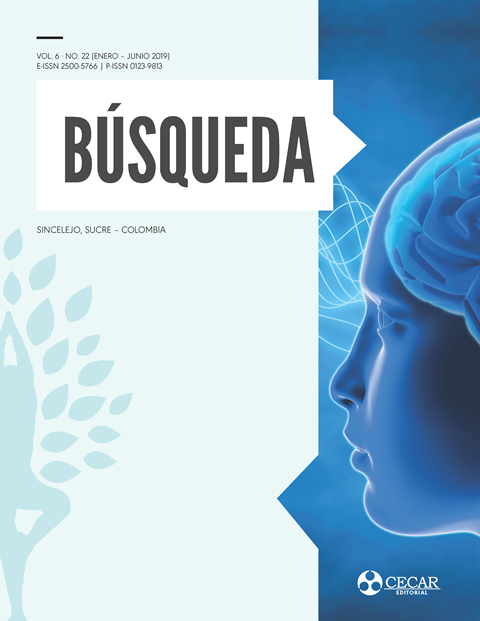Abstract
Objective. The study explores the perceptions of physicians on the challenges of intercultural training for the attention of migrant diversity in the metropolitan region. Method. Qualitative study, flexible design, through in-depth interviews. The saturation determined the size of the non-representative sample in 13 physicians. Results. The speeches show three axes of analysis: perception about the immigrant patient, intercultural training and the challenges of immigrant care, and proposals for intercultural training. Conclusions. The study provides evidence on the need for intercultural medical training, an important public policy in Chile that stresses the Medical Education model.
Licence

This work is licensed under a Creative Commons Attribution-ShareAlike 4.0 International License.
References
Breilh, J. (2010). Las tres ‘S’ de la determinación de la vida: 10 tesis hacia una visión crítica de la determinación social de la vida y la salud. Rio de Janeiro: Cebes. http://repositorio.uasb.edu.ec/bitstream/10644/3412/1/Breilh,%20J-CON-117-Las%20tres%20S.pdf
Butler, M., McCreedy, E., Schwer, N., Burgess, D., Call, K., Przedworski, J., & Kane, R. L. (2016). Improving Cultural Competence to Reduce Health Disparities. Rockville (MD): Agency for Healthcare Research and Quality (US). https://www.ncbi.nlm.nih.gov/books/NBK361126/
Cabieses, B., Bernales, M., & McIntyre, A.M. (2017). La migración internacional como determinante social de la salud en Chile: evidencia y propuestas para políticas públicas. https://www.udd.cl/dircom/pdfs/Libro_La_migracion_internacional.pdf
Delgado-Bolton, R., San-Martín, M., Alcorta-Garza, A., & Vivanco, L. (2015). Medical empathy of physicians-in-training who are enrolled in professional training programs. A comparative intercultural study in Spain. Atencion Primaria, 48(9), 565-571. https://doi.org/10.1016/j.aprim.2015.10.005
Dietz, G. (2017). Interculturalidad: una aproximación antropológica. Perfiles educativos, 39(156), 192-207. https://doi.org/10.22201/iisue.24486167e.2017.156.58293
Fleckman, J. M., Dal Corso, M., Ramirez, S., Begalieva, M., & Johnson, C. C. (2015). Intercultural competency in public health: a call for action to incorporate training into public health education. Frontiers in public health, 3, 210. https://doi.org/10.3389/fpubh.2015.00210
Gómez del Campo-del P., Medina-Pacheco, B., & Hernández-Martínez, I. (2018). Autoconcepto y motivación en adolescentes que abandonan voluntariamente sus estudios de preparatoria. Una aproximación cualitativa. Búsqueda, 5(21), 135-145. https://doi.org/10.21892/01239813.400
González-Rábago, Y., & Martín, U. (2017). Salud y determinantes sociales de la salud en hijos e hijas de personas inmigrantes internacionales: ¿desigualdades sociales en salud desde la infancia? Gaceta Sanitaria. https://doi.org/10.1016/j.gaceta.2017.10.007
Instituto Nacional de Estadísticas. (2017). Características de la inmigración internacional en Chile, Censo 2017. http://www.censo2017.cl/descargas/inmigracion/181123-documento-migracion.pdf
International Organization for Migration (2018). World Migration Report 2018. Geneva: IOM. https://www.iom.int/wmr/world-migration-report-2018
Leyerzapf, H., & Abma, T. (2017). Cultural minority students’ experiences with intercultural competency in medical education. Medical education, 51(5), 521-530. https://doi.org/10.1111/medu.13302
Liberona Concha, N. (2015). Poder, contrapoder y relaciones de complicidad entre inmigrantes sudamericanos y funcionarios del sistema público de salud chileno. Si Somos americanos, 15(2), 15-40. https://doi.org/10.4067/s0719-09482015000200002
Llamosas García, S. (2016). Repercusión de las desigualdades sociales en el estado y procesos de salud/enfermedad de los inmigrantes económicos y su relación con los servicios sanitarios públicos (Tesis de pregrado) Escuela Universitaria de Enfermería de Vitoria-Gasteiz. España. https://addi.ehu.es/bitstream/handle/10810/19320/Llamosas_Garc%C3%ADa%2C%20Sheila_TFG.pdf?sequence=3&isAllowed=y
Malmusi, D., Muntaner, C., Borrell, C. (2018). Social and Economic Policies Matter for Health Equity: Conclusions of the SOPHIE Project. International Journal of Health Services, 48(3), 417-434. https://doi.org/10.1177/0020731418779954
Murrow, G. B., & Murrow, R. (2015). A hypothetical neurological association between dehumanization and human rights abuses. Journal of Law and the Biosciences, 2(2), 336-364. https://doi.org/10.1093/jlb/lsv015
Paredes, M. T. V., Cuevas, L. M. T., Galindez, J. A. O., Ríos, D. A. T., & Bejarano, M. A. (2016). La migración internacional y las condiciones de vida: Explorando el caso colombiano. Migraciones. Publicación del Instituto Universitario de Estudios sobre Migraciones. España, (40), 153-181. https://doi.org/10.14422/mig.i40.y2016.013
Phelan, J.C. (2015). Is racism a fundamental cause of inequalities in health? Annual Review of Sociology, 41, 311–330. https://www.annualreviews.org/doi/abs/10.1146/annurev-soc-073014-112305
Priest, N., & Williams, D. (2017). Racial discrimination and racial disparities in health. The Oxford Handbook of Stigma, Discrimination, and Health. 76, 163–82. https://doi.org/10.1093/oxfordhb/9780190243470.013.7
Paternotte, E., van Dulmen, S., Bank, L., Seeleman, C., Scherpbier, A., & Scheele, F. (2017). Intercultural communication through the eyes of patients: experiences and preferences. International journal of medical education, 8, 170. https://doi.org/10.5116/ijme.591b.19f9
Paternotte, E., Scheele, F., Van Rossum, T. R., Seeleman, M. C., Scherpbier, A. J., & van Dulmen, A. M. (2016). How do medical specialists value their own intercultural communication behaviour? A reflective practice study. BMC Medical Education, 16(1), 222. https://doi.org/10.1186/s12909-016-0727-9
Pulido Fuentes, M. (2017). Una mirada desde la salud intercultural en programas de cooperación al desarrollo. Boletín americanista, (74), 33-51. http://revistes.ub.edu/index.php/BoletinAmericanista/article/view/17551
Rivera B, Casal B, Currias L. (2016). The health inmigrant effect on mental health: determinants and implications for mental health policy in Spain. Adm policy ment health, 43(4):616-627. https://doi.org/10.1007/s10488-015-0668-3
Smith, J. (2018). Migrant health is public health, and public health needs to be political. The Lancet Public Health, 3(9), e418. https://doi.org/10.1016/s2468-2667(18)30161-0
Thayer Correa, L. E., & Durán Migliardi, C. S. (2015). Gobierno local y migrantes frente a frente: nudos críticos y políticas para el reconocimiento. Revista del CLAD Reforma y Democracia, 63, 127-162. http://old.clad.org/portal/publicaciones-del-clad/revista-clad-reforma-democracia/articulos/063-octubre-2015/Thayer.pdf
Thomas F, Gideon J. (2014) Migration, Health and Inequality. London, Zed Books.
Tirzo Gómez, J., & Hernández, J. G. (2010). Relaciones interculturales, interculturalidad y multiculturalismo; teorías, conceptos, actores y referencias. Cuicuilco, 17(48), 11-34. http://www.scielo.org.mx/scielo.php?script=sci_arttext&pid=S0185-16592010000100002
Tijoux, M. E y Córdova, M. G. (2015). Racismo en Chile: colonialismo, nacionalismo, capitalismo. Polis, Revista Latinoamericana, 14(42), 7-13. https://doi.org/10.4067/s0718-65682015000300001
Urrutia A, R. (2018). Percepciones de la educación intercultural en la relación médico paciente inmigrante en médicos de Chile. Rev Perú Med Exp Salud Pública, 35(2): 205-13. https://doi.org/10.17843/rpmesp.2018.352.3404
Vega Solís, C; Gómez Martín, C; Correa, A. (2016). Circularidad migratoria entre Ecuador y España. Transformación educativa y estrategias de movilidad. Migraciones. Publicación del Instituto Universitario de Estudios sobre Migraciones, 39, 183-210. https://doi.org/10.14422/mig.i39.y2016.007
Williams, D. R., Lawrence, J. A., & Davis, B. A. (2019). Racism and health: Evidence and needed research. Annual review of public health. https://doi.org/10.1146/annurev-publhealth-040218-043750
Wickramage, K., Vearey, J., Zwi, A. B., Robinson, C., & Knipper, M. (2018). Migration and health: a global public health research priority. BMC public health, 18(1), 987. https://doi.org/10.1186/s12889-018-5932-5


 PDF (Español (España))
PDF (Español (España))
 HTML (Español (España))
HTML (Español (España))



